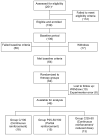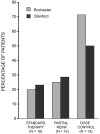Conditioned pharmacotherapeutic effects: a preliminary study
- PMID: 20028830
- PMCID: PMC2850283
- DOI: 10.1097/PSY.0b013e3181cbd38b
Conditioned pharmacotherapeutic effects: a preliminary study
Abstract
Objective: To test the hypothesize that psoriasis patients treated under a partial schedule of pharmacologic (corticosteroid) reinforcement would show less severe symptoms and relapse than those given the same amount of drug under standard conditions. Behavioral conditioning as an inherent component of many pharmacotherapeutic protocols has never been examined.
Methods: A double-blind, simple randomization intervention was conducted with 46 patients from California and New York. Initially, lesions were treated with 0.1% acetonide triamcinolone under standard treatment conditions. Thereafter, a Standard Therapy group continued on continuous reinforcement (active drug every treatment) with 100% of the initial dose; Partial Reinforcement patients received a full dose 25% to 50% of the time and placebo medication other times; Dose Control patients received continuous reinforcement with 25% to 50% of the initial dose.
Results: Severity of disease scores in California neither supported nor refuted the hypothesis. In New York, where there was no difference between Partial Reinforcement and Dose Control groups at baseline, partial reinforcement effected a greater reduction in lesion severity than Dose Control conditions and did not differ from Standard Therapy patients receiving two to four times more drug. For the entire population, the frequency of relapse under partial reinforcement (26.7%) was lower than in Dose Control patients (61.5%) and did not differ from full-dose treatment (22.2%).
Conclusions: A partial schedule of pharmacotherapeutic reinforcement could maintain psoriasis patients with a cumulative amount of corticosteroid that was relatively ineffective when administered under standard treatment conditions. Conceivably, corticosteroid administration only one quarter or half as frequently as currently prescribed is sufficient to treat psoriasis. We posit, however, that these preliminary observations implicate conditioning processes in-and for the design of-regimens of pharmacotherapy.
Figures



Comment in
-
Placebo response?Psychosom Med. 2010 Jun;72(5):505; author reply 505-6. doi: 10.1097/PSY.0b013e3181e2d141. Epub 2010 May 24. Psychosom Med. 2010. PMID: 20498291 No abstract available.
References
-
- Guess HA, Kleinman A, Kusel, Engel LW, editors. The science of the placebo. London: BMJ Books; 2002.
-
- Ader R. The role of conditioning in pharmacotherapy. In: Harrington A, editor. The Placebo Effect: An Interdisciplinary Exploration. Cambridge: Harvard Univ. Press; 1997. pp. 138–65.
-
- Ader R, Cohen N. Behaviorally conditioned immunosuppression and murine systemic lupus erythematosus. Science. 1982;215:1534–6. - PubMed
Publication types
MeSH terms
Substances
Grants and funding
LinkOut - more resources
Full Text Sources
Other Literature Sources
Medical

